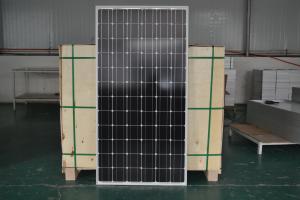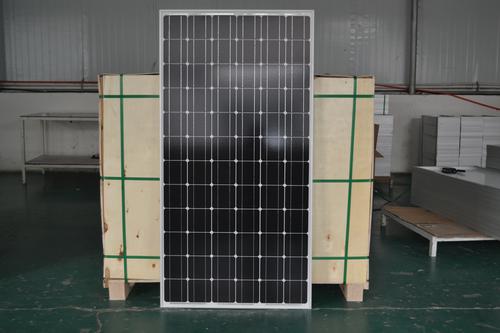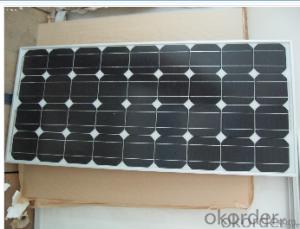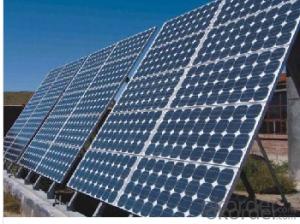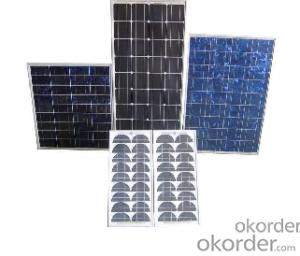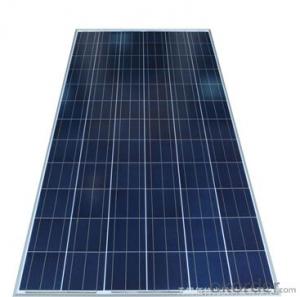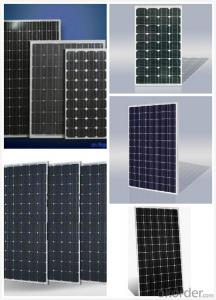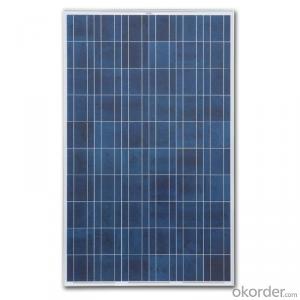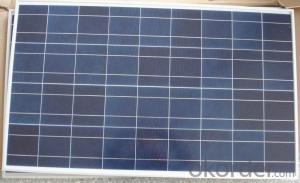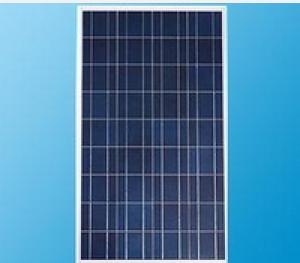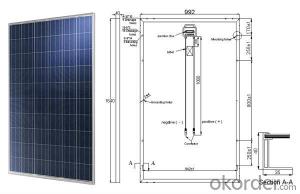Solar Panels Sacramento 250W Solar Module
OKorder Service Pledge
Quality Product, Order Online Tracking, Timely Delivery
OKorder Financial Service
Credit Rating, Credit Services, Credit Purchasing
You Might Also Like
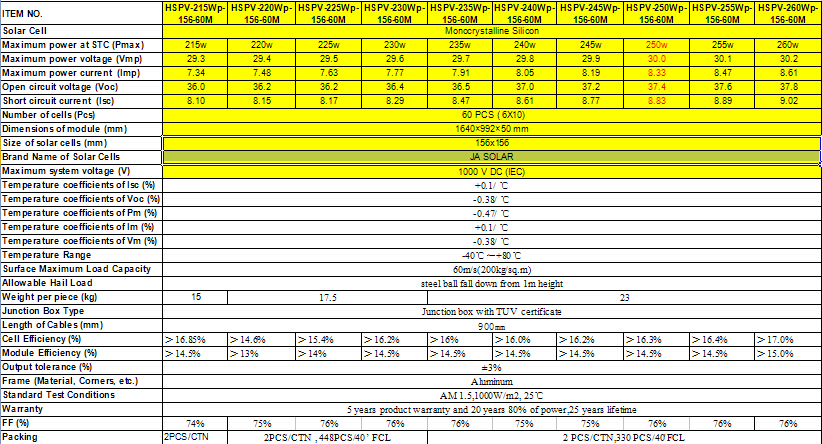
- Q: if i have a 0 Watt solar panel what does that mean. does that mean it will charge a battery 0 watts per hour? Lets say i hook this up to a car battery and use the car battery to run computer stuff. How much will this charge the battery?
- It will be less than a trickle charger on the battery. It is about .85 amps at 2 volts dc.
- Q: How do solar panels affect the electrical grid?
- Solar panels can have both positive and negative effects on the electrical grid. On the positive side, solar panels generate clean and renewable energy, which reduces the reliance on fossil fuels and decreases greenhouse gas emissions. Additionally, solar panels can help decentralize the grid by allowing individual households or buildings to generate their own electricity, reducing strain on the overall grid. However, the intermittent nature of solar power can pose challenges for grid operators, as it requires careful management to balance supply and demand. Moreover, the increased number of solar installations can also lead to voltage fluctuations and grid instability if not properly managed. Overall, while solar panels offer numerous benefits, their integration into the electrical grid requires careful planning and coordination.
- Q: If I wanted to add solar panels to my home to produce on average, 8 kWh of electricity daily, how much do you estimate it would cost using state of the art technology?I live in Virginia (Washington DC Metro Area), and I have Dominion Power. I pay the following electric rates:Jun-Sep $0.0904/kWhOct-May $0.0776/kWhAnnual Ave: $0.0824/kWhDistribution charges add on approximately another $0.0228/kWh.How long would the ROI for an 8 kWh/day solar system be?
- Figure 8 hours of sun per day, so 8 kW-hr is a rate of kW, which is a medium sized panel, probably not enough to operate your house totally, unless you have a very small unit. Averaged over 24 hours, that is power at a rate of only 300 watts, enough for a TV. Average US home use is .2 kW, which over 24 hours is 29 kW-hr, plus you need extra for cloudy days, peak demands, and to charge batteries. You have to decide off-grid or on-grid, and if you want to (and are allowed to) sell excess power to the power company. Off gird, the cost of batteries and charge controller are a large part of the cost. On-grid, you have to purchase equipment approved by the power company to match your power with the grid. Panels will cost about $3 per watt, so for 000 watts that is $3000. Double that for installation, then add in cost of charge controller, inverter, batteries, etc. The last items depend on your alternatives, see paragraph above. .
- Q: Can solar panels be used in areas with limited sunlight?
- Yes, solar panels can still be used in areas with limited sunlight. While solar panels are most efficient in direct sunlight, they can still generate electricity even in areas with less sunlight. The panels can capture diffuse sunlight and convert it into usable energy. However, the overall energy output may be lower compared to areas with abundant sunlight. Additionally, advancements in solar technology and the use of more efficient panels can further enhance their performance in areas with limited sunlight.
- Q: I've built a set of lights, fan and a clock running on only solar power. The problem is, i have to present it tomorrow and when the light isn't particularly strong it won't work too well. It works flawlessly when its under my desk light on max brightness but the only the light works when i set it to low brightness. Currently, tomorrow in my city it won't be sunny so any advice for trying to make it work under low light?
- Solar panels are designed to be used to recharge a battery or series of batteries, not for direct power. That is the inherent weakness of solar systems. The only way to have it work in low light conditions if to have several cells wired in series and have a voltage regulator to limit the amount of voltage that can be supplied. Other than that, add a battery and a charging circuit that the cell would supply power to.
- Q: When you consider that solar panels will not produce enough electricity in their service life to cover their cost should we subsidize them anyway? that much of the cost of a solar panel is the energy to manufacture, install, transport and maintain them. Shouldn't the market determine whether they are worth installing?Is subsidizing them taking money away from research that could be spent on more viable alternatives?Should we be taxed to pay for others solar panels when they don't work?
- Recent investments into solar panels have brought about a couple of interesting realizations and developments. One, as you state, is that traditional solar panels (silicon crystalline panels) are not currently cost effective, even will full-scale manufacturing production. It's possible that improved manufacturing techniques will bring the retail price down somewhat, but it needs to be brought down a lot to make economic sense without incentives. The other, though, is that a new method of producing solar panels - thin film technologies - has been developed. These are currently quite expensive, but because there are no crystals to grow, they are expected to drop significantly in price as production increases. I believe that this technological development has been made as a direct result of government support for solar energy. It is not taking money away from research - rather it is providing the incentive for research. I could be wrong. I've been wrong before. But I think that these new solar technologies, which are already hitting the market, will dramatically change the economics of solar energy.
- Q: Can someone tell me the average savings you get PER solar panel installed? I do not have the money to invest in a bunch of them at once, so I am forced to buy one at a time, when I have the money. So how much can I expect to save after I buy the first one?
- No matter what or how you do it it is best to get off coal and nukes. So it cost a little bit of money you are buying 30 years of electric. How much will you spend adding in cost of living increases over the next 30 years? Solar really is pretty cheap if you take the time to do the long term math. If you use your cost at to days rates it does seem like a lot. But if you do the math like in real life with 3.5% compounded cost of living increases per year and 6.5% fuel increases per year. Well, you pay a lot more renting power. One other thing to think about and Al Gore keeps pointing it out is, Will your off spring be alive in 50 years from now if you don't buy the solar panel? Kind of like not going to the doctor because you can't afford the bill. Well I would rather owe a bill to a doctor that I will have trouble paying then not be alive at all to try. If you don't have the money to jump in and go full blown Green you should buy a starter system. You can get a system that can be expanded to 3000 watts (enough to power an energy efficient home). Would cost you about $8000 USD to get started and then you could add three solar modules at a time till you get it up to the 3000 watt max. And even have backup power. Or you could just buy a 000 watt system for about the same price and just add 3 of them over the years. There are many ways to get started. The deal is everyone needs to get started even if it is a small system. If all 50 million homes in the USA would install a small 000 watt system with 4 hours of sun light a day. We would provide (000 watts times 4 hours times 365 days times 50 million homes) 29,000,000,000,000 watts not from coal or nuke plants per year. I wonder if that would help?
- Q: I need a list of worldwide solar panel manufactures from china, US, Spain, Germany, Japan etc...Can any one direct ne to such place?I rather it will also contain comparison of parameters like efficiacy, quality etc and to be divedied by country of manufacturing.Thank you
- Actually Ofir, it is much easier and less expensive than you might believe. What you need is a magazine, like, Solar Today. There is only one that I am familiar with that gets into the nuts and bolts of solar panel manufacturers, installation, and other types of renewable energy. It's called, Home Power Magazine. We have a home that has been powered by the wind and sun for the last 0 years or so, and most of our initial information came from Home Power, and afterward, from many of the sources that they have in their articles. Every few issures, they take an item connected to renewable energy, such as an inverter, wind turbine, water turbine, or solar panel, and list all the different models that are available. They are broken down by manufacturer, and include specifications like power output, range of voltages, efficiency, materials, and even where they are manufactured. If you subscribe online for one year, the cost is around $25 USD, you will have access to all the previous issues that are archived on their website. You can use their search engine to locate an article listing all the solar panels, they did one a year or so ago with all the information you are looking for. Despite what you might be hearing, solar power usage is growing at an incredible rate. In the US alone, there are over 00,000 homes and businesses operating some level of solar power right now, that's good news. As far as different countries using different requirements, most all of the manufacturers today are selling their products to most countries worldwide, they are designed to meet requirements for almost anyplace you might use them. Check the magazine out today, you might learn more than you were originally looking for. I will include their link below, and some other good sources for information. You can google any one of them to find their website. Good luck, and take care...Rudydoo
- Q: I am writing some mock legislation for a school club and I need to know some of the environmental effects of solar panels. Also, where can I find specific studies(like from colleges and/or universities) proving these benefits as well as benefits and reasons of going green.
- Hi there, as a great starting point take a look here okorder Should give you most of what you require
- Q: Can solar panels be used for powering electric gates?
- Yes, solar panels can be used to power electric gates. Solar panels convert sunlight into electricity, which can be stored in batteries or directly used to power various devices, including electric gates. This allows for a sustainable and environmentally friendly way to operate electric gates without relying on traditional electrical grids.
Send your message to us
Solar Panels Sacramento 250W Solar Module
OKorder Service Pledge
Quality Product, Order Online Tracking, Timely Delivery
OKorder Financial Service
Credit Rating, Credit Services, Credit Purchasing
Similar products
Hot products
Hot Searches
Related keywords
